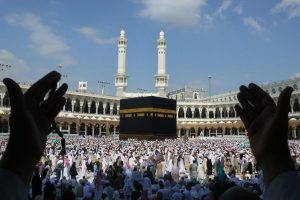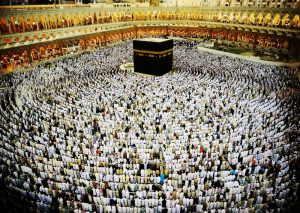By Editorial Staff
On their journey to Makkah, pilgrims hope and pray that their hajj (Pilgrimage to Makkah) will be accepted. They want to be rewarded, gain Paradise and the pleasure of Allah and to be saved from the Hellfire. To achieve this, they need to meet the requirements of Hajj.
What are the requirements for an accepted Hajj?
1. Sincerity
The pilgrim must have a purely sincere intention to observe this great pillar of Islam, Hajj, solely for the sake of Allah. This is the most important requirement which if not met, the Hajj will be invalid. Allah says,
“Though they were not commanded but to worship (One) God making the (practice of their) religion (pure and) sincere to Him (alone), being ever upright (of heart)” (Quran 98:5)
Observing Hajj for showing off invalidates it. On the authority of Abu Hurayrah (may Allah be pleased with him), who said that the Messenger of Allah (ﷺ) said: Allah (glorified and exalted be He) said: I am so self-sufficient that I am in no need of having an associate. Thus he who does an action for someone else’s sake as well as Mine will have that action renounced by Me to him whom he associated with Me. (Muslim)
2. Giving people their due rights

If the pilgrim succeeds in keeping away from bad manners, they will be back home with no sin at all.
The pilgrim must hasten to give people their rights back. This includes the redress of past injustices, paying off debts, etc. Although Hajj is one of the greatest means of forgiveness of sins, the other sins related to people’s rights require their pardon first to be forgiven.
Narrated Abu Huraira: Allah’s Messenger (ﷺ) said, “Whoever has wronged his brother, should ask for his pardon (before his death), as (in the Hereafter) there will be neither a Dinar nor a Dirham. (He should secure pardon in this life) before some of his good deeds are taken and paid to his brother, or, if he has done no good deeds, some of the bad deeds of his brother are taken to be loaded on him (in the Hereafter). (Al-Bukhari)
It is also highly recommended to seek the pardon of family members, relatives, friends and other people for anything the pilgrim may have done and made them angry.
3. Taking provisions for the journey
The pilgrim should have enough food or enough money to be able to buy food, drink, clothes and other things necessary for the journey.
Narrated Ibn `Abbas: The people of Yemen used to come for Hajj and used not to bring enough provisions with them and used to say that they depend on Allah. On their arrival in Medina they used to beg the people, and so Allah revealed,
“Moreover, take with you your (own) provisions and, indeed, the best provision is to be ever God-fearing. (Quran 2:197).” (Al-Bukhari)
4. Having lawful money
For Hajj to be accepted and for du’aa (supplication) to be answered, the pilgrim’s money must be earned lawfully.
Abu Hurairah (May Allah be pleased with him) said: The Messenger of Allah (ﷺ) said, “O people! Allah is Pure and, therefore, accepts only that which is pure. Allah has commanded the believers as He has commanded His Messengers by saying:
‘O Messengers! Eat of the good things, and do good deeds.’ (Quran 23:51) And He said:
‘O you who believe (in the Oneness of Allah – Islamic Monotheism)! Eat of the lawful things that We have provided you…”‘ ( Quran 2:172).
Then he (ﷺ) made a mention of the person who travels for a long period of time, his hair are dishevelled and covered with dust. He lifts his hand towards the sky and thus makes the supplication: ‘O Lord! O Lord!’ But his food is unlawful, his drink is unlawful, his clothes are unlawful and his nourishment is unlawful, how can, then his supplication be accepted?” (Muslim)
5. Travelling with a good company
It is recommended that the pilgrim travels in the company of the people of knowledge about the rites of Hajj. If he or she makes mistakes, forgets something or have no knowledge about a certain rite of the Hajj, they should be there for help. This is highly recommended especially for people observing Hajj for the first time because they are more liable to miss something or make mistakes.
6. Making a will
Making a will before setting off for Makkah is recommended.
Narrated `Abdullah bin `Umar: Allah’s Messenger (ﷺ) said, “It is not permissible for any Muslim who has something to will to stay for two nights without having his last will and testament written and kept ready with him.” (Al-Bukhari and Muslim)
7. A Mahram for a woman
A mahram for a woman is the male person who Allah made it unlawful for her to marry for good because they are related by blood such as a father or a son, breastfeeding or marriage such as her father-in-law.
For a woman to perform the Hajj, she has to travel in the company of her husband or a mahram of hers. As for a woman who has no mahram to accompany her, there are two opinions regarding whether she is allowed to treavel or not. Imam Al-Tirmidhi summarizes this issue as follows:
“Scholars hold different opinions concerning a woman who is wealthy enough to perform the Hajj but has no Mahram. Is the Hajj obligatory for her?
Some scholars are of the opinion that it is not obligatory for her to observe the Hajj. Allah says,
“Thus Hajj-Pilgrimage to the (Sacred) House (in Makkah) is owed to God, as an obligation upon all people who are able to attain a way to it. And as to those who disbelieve (this, know), then, (that) God is, indeed, self-sufficient, without (any need for any of His creation in) all the worlds.” (Quran 3:97)
Unless a woman has a mahram, then, she is not able to attain a way to it. This is the opinion of Sufyan Al-Thawri and the scholars of Kufa, a city in Iraq.
Other scholars hold the opinion that a woman who has no mahram may perform the Hajj only if the roads or the journey are safe and secure. She can set off with other people. This is the opinion of Malik ibn Anas and Imam Al-Shafi’i.”
8. Learning how to observe the Hajj
It is highly recommended for the person who wants to perform the Hajj to learn its rites and rulings so that he or she can perform it properly and make sure that the things that invalidate it are avoided. Moreover, the pilgrim will get the best of reward for both learning and performance. It happens that some people miss very essential elements of hajj such as Standing on ‘Arafat.
[ica_orginalurl]








